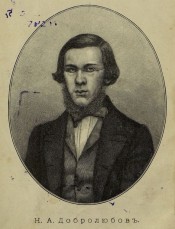
Birthday of Russian literary critic, poet and publicist Nikolai Alexandrovich Dobrolyubov
On January 24 (February 5), 1836, in Nizhny Novgorod, the Russian literary critic, poet and publicist Nikolai Alexandrovich Dobrolyubov was born into the family of the priest of the Nizhny Novgorod St. Nicholas Verkhneposadskaya Church, Alexander Ivanovich Dobrolyubov (1812–1854) and Zinaida Vasilyevna, née Pokrovskaya (1816–1854).
Nikolai Dobrolyubov received his primary education at home, showing extraordinary learning abilities from an early age. He read a lot and already at the age of 13 he translated the ancient Roman poet Horace. As a child, Dobrolyubov was more attached to his mother than to his father, from whom, in his words, “I received my best qualities”. “The harsh life in the house of a domineering and inhospitable father, who demanded unconditional obedience from all family members, instilling fear in those around him, left a stamp of isolation on Dobrolyubov at an early age”, - notes an article in the magazine “People's Teacher” (Narodny Uchitel') (1911. № 19–20, December ), dedicated to the fiftieth anniversary of the death of the writer.
From 1848 to 1853 he studied at the Nizhny Novgorod Theological Seminary. In 1853 he moved to St. Petersburg and entered the Faculty of History and Philology of the Main Pedagogical Institute, from which he graduated with honors in 1857, but for freethinking and conflicts with the director of the institute I. I. Davydov he was deprived of a gold medal.
In March 1854, Nikolai Dobrolyubov’s mother died, and in August, his father died, that produced a strong spiritual change in him. During this period, his political position was formed, characterized by anti-monarchical, anti-religious and anti-serfdom views. In the diary which Dobrolyubov kept throughout 1851–1859, in 1855 he wrote that he and his friends “touched on great issues” and that they were “most interested in their native Rus' with its great future”. Two years later, in an entry dated January 15, he admitted: “I am a desperate socialist, even now ready to join a poor society with equal rights...”.
He published his first works in the illegal newspaper “Slukhi” (Rumors). In 1856, after meeting N. G. Chernyshevsky, he began to collaborate in "St. Petersburg Gazette", then in "Sovremennik", "Svistok" (Whistle) (a satirical supplement to "Sovremennik"), "Kolokol", "Iskra", and "Journal for education" and other publications. His articles “What is Oblomovism?” (1859), “The Dark Kingdom” (1859), “When will the real day come?” (1860), “A Ray of Light in the Dark Kingdom” (1860) developed the method of so-called real criticism, putting forward as its task the understanding of the “truth of life” reflected in the works of great artists. He criticized autocracy and serfdom in Russia and believed that the highest happiness of a person lies in the pursuit of the common good.
“Dobrolyubov’s criticism was combined with well-defined ideals and convictions, with a widely developed concept of solidarity of personal and social benefit, with a desire that never abandoned him for greater justice in human relations. In his brilliant articles one could see “a cold mind and an ardent heart” which, combined with the above-mentioned methods of his critical activity, immediately won him a privileged position both among readers and in the editorial office itself”, - emphasizes an article in the magazine “People's Teacher” (1911 № 19–20, December).
In May 1860, Nikolai Dobrolyubov went abroad to treat tuberculosis, but it did not help, and on November 17 (29), 1861 in St. Petersburg at the age of 25, the young writer died. According to the memoirs of A. Ya. Panaeva, who left memoirs about V. G. Belinsky’s circle and about the employees of the "Sovremennik magazine", during the last days N. A. Dobrolyubov regretted that during his short life “he did not have time to do anything”. He was buried at the Volkovskoye cemetery next to the grave of V. G. Belinsky. Later, the section of the cemetery with their burials began to be called “Literary Bridges” and became a resting place for other prominent figures of Russian science and culture.
Лит.: Добролюбов Николай Александрович // Большая российская энциклопедия. Электронная версия (2023). Режим доступа: https://old.bigenc.ru/literature/text/2629775; Елизаветина Г. Г. Н. А. Добролюбов и литературный процесс его времени. М., 1989; Кулешов В. И. Русская демократическая литература 50–60-х годов XIX века: Учебное пособие для студентов высших учебных заведений, обучающихся по специальности «Русский язык и литература». М., 1989.
Based on the Presidential Library's materials:
Материалы для биографии Н.А. Добролюбова, собранные в 1861–1862 годах. Т. 1. М., 1890;
Учитель Н. Памяти Н. А. Добролюбова // Народный учитель: ежемесячный журнал. Г. 6. 1911. № 19–20. Декабрь. С. 2–3 (сканы 4–5) (Доступно в электронном читальном зале);

